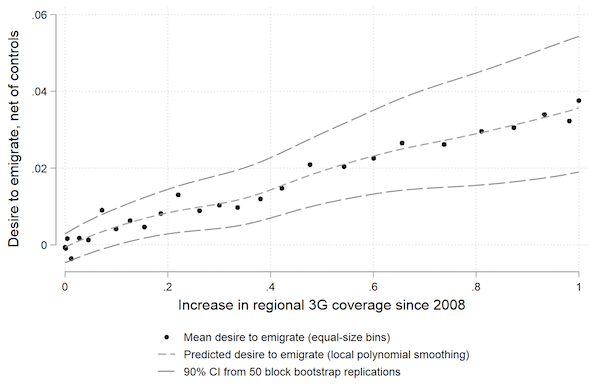Lambert here: My impression is that mobile technology, penetration, and services are far better in the so-called “Third World” than they are in the United States.
Joop Adema, PhD candidate, IFO Insitute and University of Munich, Cevat Giray Aksoy, Associate Director at European Bank for Reconstruction and Development and Assistant Professor of Economics at King’s College, London, and Panu Poutvaara,Professor of Economics at the University of Munich and Director of the ifo Center for International Institutional Comparisons and Migration Research, IFO Institute. Originally published at VoxEU.
The mobile internet has changed how people live, work, and exchange information. Fast broadband can boost household income and affect political awareness. This column examines how 3G mobile internet rollout affects people’s desire and plans to emigrate. Increases in 3G coverage raise individuals’ desire and plans to emigrate, especially for those who do not have networks abroad, while it negatively affects perceptions of relative financial wellbeing and trust in the government. Internet access may be boosting the desire to emigrate while reducing the costs of finding information on opportunities abroad.
The internet and mobile phones have changed how people live, work, connect, and exchange information. The number of internet users increased globally from 410 million in 2000 to nearly 4.9 billion in 2021 and is expected to continue double-digit growth (International Telecommunications Union 2021). A vast majority of internet users have access through a mobile phone – there were more than 3.5 billion mobile internet subscribers in 2019 (GSMA 2019).
In recent years, research has established that the internet has major economic and political impact. Hjort and Poulsen (2019) show that the arrival of fast broadband internet positively affected employment in Africa. Zuo (2021) shows that employment probabilities of poor households in the US and their earnings increased after obtaining internet access. Guriev et al. (2019) establish that the rollout of 3G mobile internet increases awareness of government corruption and reduces trust in political institutions when the internet is not censored.
In Adema et al. (2022), we study how 3G mobile internet rollout causally affects people’s desire and plans to emigrate. We combine two unique data sets: Gallup World Polls and Collins Bartholomew’s Mobile Coverage Explorer. Combining these gives us data from 617,402 individuals living in 2,120 subnational regions in 112 countries, collected over 11 years. To derive causal effects on desire and plans to emigrate, we exploit variation in subnational 3G mobile internet coverage over time.
Desire and plans to emigrate are associated with migration flows
We first check to what extent our outcome variables (i.e. desire and plans to emigrate) are significantly associated with actual migration flows. We make use of the fact that we observe individuals’ most desired destination as well as the destination country they are planning to move to. We use these data to construct the number of people desiring and planning to migrate between any origin and destination country. We then match our desired and planned migration-flow matrix with data on actual migration flows to OECD countries between 2008 and 2018.
The results presented in Figure 1 confirm that our outcome variables are strongly associated with the official migrant flow data between 2008 and 2018. We find that the raw correlation on the origin-destination level between the log of actual migrant flows and the log of the number of people desiring to migrate from a specific origin to a specific destination is 0.77. The correlation between the log of actual migrant flows and the log of the number of people desiring to migrate from a specific origin to a specific destination is 0.68.
Figure 1 Correlation between migration intentions and actual migration flows

Increases in 3G coverage impact desire and plans to emigrate
We find that increases in 3G coverage have a sizeable impact on the desire and plans to emigrate and that the impact is approximately linear (Figure 2). An increase of 10 percentage points in 3G mobile coverage leads to an increase of 0.27 percentage points in the desire to emigrate permanently. In addition, we find that such an increase leads to an increase of 0.09 percentage points in plans to emigrate permanently over the ensuing 12 months in our preferred specification.
When moving from no to full 3G coverage, the implied aggregate effect is about 12% of the baseline average of desire and 33% of plans to emigrate permanently. The estimates imply that in a country with 10 million adult inhabitants, a move from no 3G coverage to full coverage would increase the number of people desiring to emigrate by 56,000 to 486,000.
Using municipal level data from Spain, we also show that 3G expansion not only alters emigration desires but also increases actual emigration of home-country nationals. Our estimates suggest that switching from no 3G coverage to full 3G coverage increased the annual emigration rate by 15% from the level before 3G coverage was extended.
Figure 2 The non-parametric effect of 3G rollout on the desire to emigrate

Heterogeneity analysis using causal forest
We also look beyond the average effects to understand how the causal effects vary with observable characteristics. We find the strongest treatment effects for high-income individuals in high-income regions, and the lowest effects for low-income individuals in low-income regions (Figure 3).
Figure 3 Heatmap of conditional average treatment effect (CATE)

Exploring the mechanisms behind our results, we show that the effect of 3G coverage on the desire to emigrate is strong for individuals who were without any prior network abroad; we find no statistically significant effect for those who already have a network abroad. In addition, upon receiving 3G coverage, preferred destinations change towards destination countries with lower stocks of migrants from the same origin in 2005. This suggests that internet access boosts the desire to emigrate primarily by reducing the costs of finding information on opportunities abroad, substituting for personal networks.
We also show that 3G coverage does not change the financial situation of respondents (e.g. household income) or their perceptions about the level of corruption in their country. Instead, 3G coverage has a negative effect on the perception of relative financial wellbeing as well as on trust in the government, which potentially shapes emigration desires.
Implications
Our results highlight that access to mobile internet not only increases the overall desire to emigrate but also is likely to redirect migration flows towards less popular destinations. In the medium term, this can be expected to increase international trade and knowledge transfer back to origin countries (Parsons and Vezina 2018, Fackler et al. 2020) and could also stimulate innovation in destination countries as birthplace diversity has been found to be related to economic prosperity (Alesina et al. 2013).


Hi. Ali G. Are you still in da house?
King’s College London produced this shit.
Cambridge? Can you equal it? ;)
T-Mobile / Sprint shut down 3G last week. T-Mobile / Sprint will be shutting down 4G LTE at the end of this month. All of the carriers are getting rid of 3G and 4G LTE to make way for 5G.
My life has been thrown into chaos. I am being forced to replace all of my devices, even phones that are only a couple of years old. The T-Mobile rep said that they are working around clock to get replacement devices out to customers.
I use T-Mobile and have had a pre-paid plan for years since I refuse contracts; I haven’t had anything from them about 4G ending/changing. Looking for a minute I see an article on CNet (not sure how good they are anymore) but it seems to say that the restriction is on Sprint SIM cards. Still not great, but at least not whole new equipment needed. Ref: https://www.cnet.com/tech/mobile/t-mobile-will-shut-down-sprints-4g-lte-network-on-june-30-2022/
All major US mobile carriers have or will be shutting down some coverage this year: https://www.fcc.gov/consumers/guides/plan-ahead-phase-out-3g-cellular-networks-and-service
AT&T announced that it will finish shutting down its 3G network by February 2022.
Verizon announced that will finish shutting down its 3G network by December 31, 2022.
T-Mobile announced that it will finish shutting down Sprint’s 3G CDMA network by March 31, 2022 and Sprint’s 4G LTE network by June 30, 2022. It also announced it will shut down T-Mobile’s 3G UMTS network by July 1, 2022, but has not yet announced a shutdown date for its 2G network.
Here’s T-Mobile’s more detailed info on their shutdowns: https://www.t-mobile.com/support/coverage/t-mobile-network-evolution
It seems that in many cases you should be able to receive continued coverage by switching SIM cards. Your couple of year old phones should not need to be replaced.
TMobile is keeping 2G until Dec Weird that they are sunsetting that later.
My 2G phone still works.
https://www.digi.com/blog/post/2g-3g-4g-lte-network-shutdown-updates
Can anyone recommend a 4G dumbphone? I am waiting for Justine Haupt’s rotary dumbphone but it might not be ready on time.
In America we see periodical interest in emigrating abroad around the time of presidential elections. This interest usually expressed in a form of pique against their preferred candidate losing and reminding me of nothing more than that child who exclaims, ‘Fine, I’ll take my ball and go home!’ Reality is few actually follow through, and in my opinion, good riddance!
Further reality is few have any experience abroad beyond a brief vacation and romanticized notions due to inadequate research. Facts are, 3rd world countries are just that. With regard to 2nd world countries like Panama or Costa Rica, maybe but then there’s language to contend with – unless – you live amongst gringos and then what’s the point? As for other 1st world countries like the UK, Canada, Europe, Oceania, or East Asia, and with the possible exception of Canada, another fact is they’re not wanted (plus they have their own problems).
So as far as I am concerned, this article is ho-hum nonsense.
“The T-Mobile rep said that they are working around clock to get replacement devices out to customers….” I heard this story several months ago. Maybe there oughta be a law about planned obsolescence.
The basic thing is that said third world didn’t have incumbent landline providers that could stifle the spread of mobile tech. And even when accounting for that, i dear say that USA is backwards even by western standards.
That said, i am unsure if making ourselves so dependent on this phone thing is such a smart idea.
I’ve heard that Kenya has some of the best cell service on the planet.
“Internet access may be boosting the desire to emigrate while reducing the costs of finding information on opportunities abroad.”
Access to global transmissions of any kind have done this. Transmissions viewed on any video monitor would have the greatest effect.
After the Cold War it was said that one of the tools the West used to bring down the Iron Curtain was television. Apparently repeated transmissions of Dallas and Dynasty into Eastern Europe presented an unbeatably attractive and positive vision of American lifestyles.
Back when Germany was divided, there was a German joke that East looked pretty much the same as the West, except everything was black and white — a reference to the incompatible television systems (PAL vs. SECAM) and that for a long while TVs could not receive color for both.
Was looking at the post on possible famine in some countries.
Thought about these vids on Youtube that people in those countries could be watching while their stomachs growl:
https://www.youtube.com/watch?v=V6x_4Z25gNs/
https://www.youtube.com/watch?v=VI8eRC4wPpk/